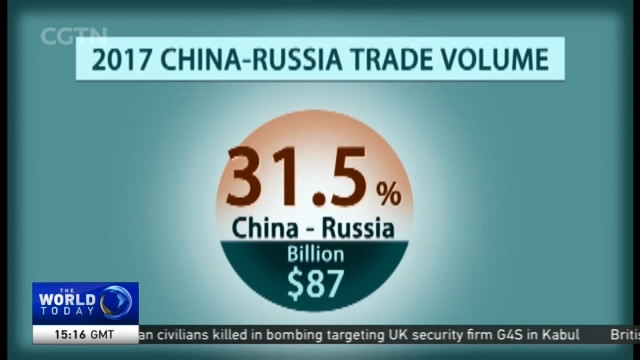
08:41, 18-Mar-2018
2018 Russia Election: How outcome might affect relations with China?

With Russia's presidential election set for Sunday, China will be watching closely to see if the outcome might influence their partnership.
CGTN's Tang Bo looks into whether a new mandate for President Putin might affect ties.
Strategic ties between China and Russia were valued in glowing terms when President Xi Jinping paid a state visit to Russia last July.
The journey concluded with over 10 billion US dollars in agreements.
However, concerns over maintaining a consistent bilateral partnership have risen as 2018 Russia's presidential election is scheduled in March.
Vladimir Putin said at a press conference last December that the election result will not affect the bilateral ties.
VLADIMIR PUTIN RUSSIAN PRESIDENT "I completely believe that the development of bilateral relationship with China has had a national consensus across Russia, and it has nothing to do with the election result. Russia and China will remain strategic partner in the long run."
Anna Kireeva, research fellow at the center for Chinese Studies of Moscow State Institute of International Relations further explains that the partnership is based on lots of common joint interests.
ANNA KIREEVA, RESERACH FELLOW MGIMO UNIVERSITY "It is something very stable, not going to change because of power transition. There could be changes in foreign policy, but the basic would be the same, like non interference to the domestic policies, no power dominance."
According to Russian customs authorities, up to the end of last year, China has become Russia's largest trading partner for 8 consecutive years.
The trade volume between China and Russia last year reached 87 billion US dollars, up over 31 percent (31.5%) from 2016. That's a lot more than the trade volumes between Russia and its second largest trading partner Germany, and its third largest one the Netherlands. Leaders of both countries have agreed to merge the Belt and Road Initiative and the idea of Eurasian Economic Union.
ANNA KIREEVA, RESEARCH FELLOW MGIMO UNIVERSITY "China has been dealing with Central Asia bilaterally, but the challenge is that doing something at a multilateral level is something that Russia would like to see, other than seeing China's expanding its cooperation with central Asian state but without Russia."
TANG BO MOSCOW Experts say, as great powers, China and Russia have very different national interests. Both sides have taken steps to ensure that the differences are not on the foreground of their bilateral ties, and have been trying to avoid any possible conflicts of state interests. That's one of the key reasons for China and Russia's successful relations as they abandon the thinking of the Cold War and a zero-sum game policy. Tang Bo, CGTN, Moscow.

SITEMAP
Copyright © 2018 CGTN. Beijing ICP prepared NO.16065310-3
Copyright © 2018 CGTN. Beijing ICP prepared NO.16065310-3